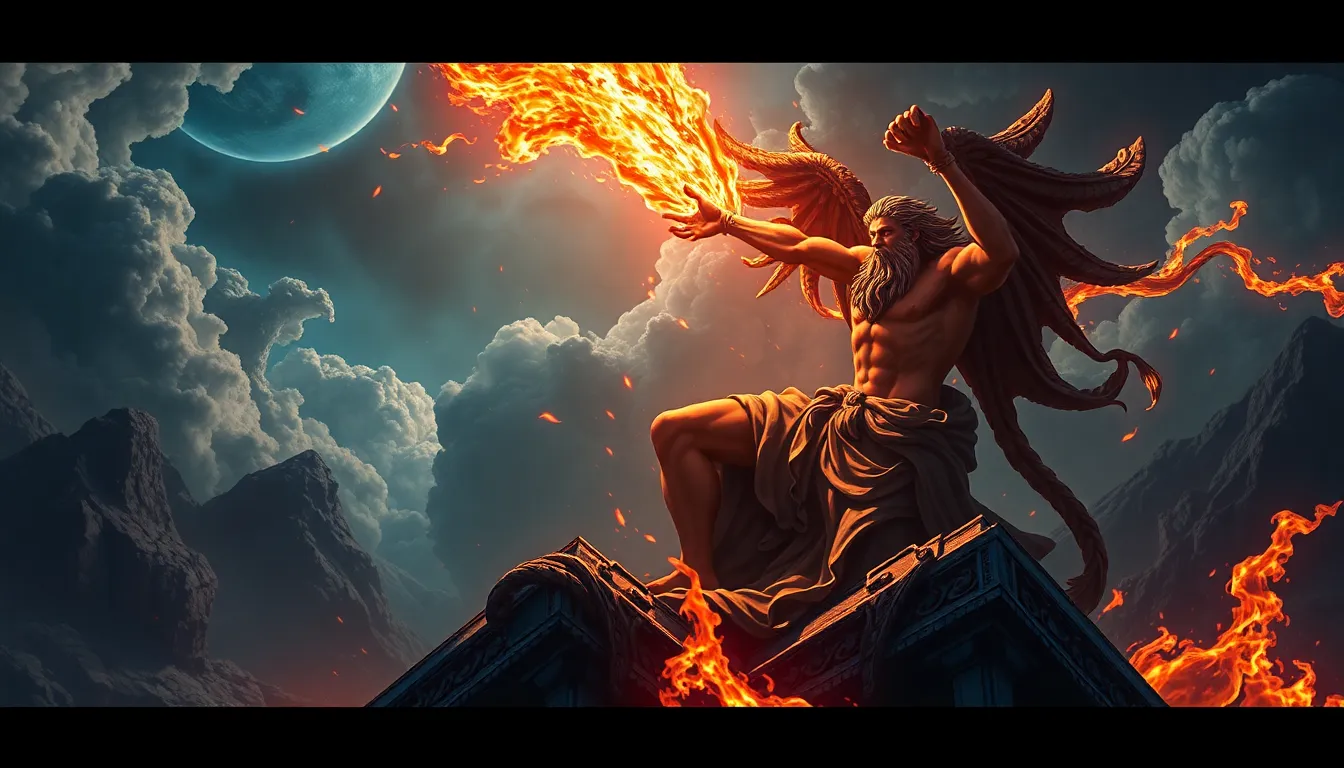Prometheus: A Titan’s Struggle Against Divine Authority
Introduction to Prometheus: The Titan Rebel
In the rich tapestry of Greek mythology, Prometheus stands out as a symbol of rebellion and defiance against divine authority. As one of the Titans, Prometheus is often portrayed as a champion of humanity, whose story encapsulates the struggle between the oppressed and their oppressors. His character serves as a reminder of the tensions that arise when the desire for progress and enlightenment clashes with the established order of the gods.
The Role of Titans in Greek Mythology
The Titans were the primordial deities that preceded the Olympian gods, born from Gaia (Earth) and Uranus (Sky). They represent a generation of gods that embody the raw forces of nature and the cosmos. The most notable Titans include Cronus, Rhea, and Oceanus, who each governed different aspects of existence.
The Titans are often seen as the ancestors of the Olympians, who eventually overthrew them in a legendary battle known as the Titanomachy. While the Titans symbolized the ancient and chaotic forces of the universe, the Olympians represented order, civilization, and human-like attributes. This dichotomy sets the stage for Prometheus’s narrative, where the struggle for knowledge and power unfolds.
The Myth of Prometheus: Theft of Fire
One of the most famous myths surrounding Prometheus is his audacious act of stealing fire from the gods and gifting it to humanity. According to the myth, after Zeus, the king of the Olympians, withheld fire from mankind, Prometheus took it upon himself to defy Zeus’s decree. Under the cover of darkness, he ascended to Mount Olympus, where he stole a spark from the divine flame.
This act of theft was not merely about providing warmth and light; fire symbolizes knowledge, enlightenment, and the spark of creativity. By giving fire to humanity, Prometheus ignited the potential for progress, innovation, and civilization. His actions can be seen as a profound statement on the importance of knowledge in overcoming adversity.
Consequences of Defiance: Punishment by Zeus
As with many tales of hubris in mythology, Prometheus faced severe consequences for his rebellion. Zeus, furious at Prometheus’s defiance, devised a cruel punishment. He ordered Prometheus to be bound to a rock in the Caucasus Mountains, where an eagle would feast on his liver each day, only for it to regenerate overnight, ensuring his eternal suffering.
This punishment highlights several themes prevalent in Greek mythology:
- Suffering: Prometheus’s endless torment serves as a testament to the cost of defiance against divine authority.
- Sacrifice: His willingness to endure pain for the sake of humanity underscores themes of altruism and selflessness.
- Justice: The myth raises questions about the nature of justice and the consequences of challenging those in power.
Prometheus as a Symbol of Resistance
Throughout history, Prometheus has been embraced as a symbol of resistance against tyranny and oppression. His story resonates with those who stand up against unjust authority, making him a timeless figure in the fight for freedom and knowledge. In contemporary society, Prometheus’s legacy can be seen in various movements advocating for:
- Human rights and dignity
- Scientific advancement and inquiry
- Environmental activism and the fight against oppression
Prometheus embodies the spirit of rebellion, inspiring individuals to challenge the status quo and seek enlightenment, even in the face of potential consequences.
Literary and Artistic Representations
The myth of Prometheus has inspired countless works of literature and art throughout history. One of the most notable literary adaptations is Mary Shelley’s “Frankenstein,” which draws parallels between Prometheus’s creation of humanity and Victor Frankenstein’s creation of life. Both stories explore the consequences of overstepping natural boundaries and the responsibilities that come with creation.
Aeschylus’s “Prometheus Bound” is another seminal work that delves deep into the themes of defiance and suffering. In this tragedy, Prometheus’s unwavering spirit is highlighted, as he refuses to submit to Zeus’s authority, showcasing his resilience and commitment to humanity.
These works reflect the enduring relevance of Prometheus’s narrative, as they examine the complexities of creation, the consequences of ambition, and the moral implications of defiance.
Philosophical Interpretations of Prometheus
Prometheus’s story has also been interpreted through various philosophical lenses, particularly during the Enlightenment and Romantic periods. Enlightenment thinkers viewed Prometheus as a symbol of reason and knowledge, championing the idea that humanity could achieve greatness through intellect and inquiry.
In contrast, Romantic writers often emphasized the tragic aspects of Prometheus’s defiance, focusing on the isolation and suffering that accompanies such rebellion. This duality raises existential questions about the nature of freedom, responsibility, and the ethical implications of one’s actions.
Philosophers have debated the moral lessons of Prometheus’s myth, asking whether his defiance was a noble act of sacrifice or a reckless challenge to the divine order.
Conclusion: The Enduring Legacy of Prometheus
Prometheus remains a powerful figure in discussions surrounding authority, individuality, and the quest for knowledge. His struggle against Zeus and the Olympian order echoes through the ages, inspiring generations to challenge oppressive systems and seek enlightenment.
As we reflect on Prometheus’s legacy, it becomes clear that his story is not just a myth; it is a call to action for those who dare to question authority and strive for a better understanding of the world. In an era still fraught with struggles for freedom and knowledge, Prometheus’s tale continues to inspire modern movements, reminding us that the pursuit of truth often comes at a cost.




